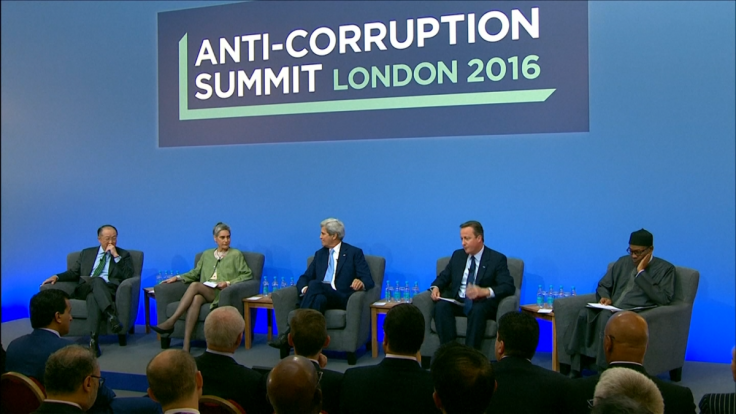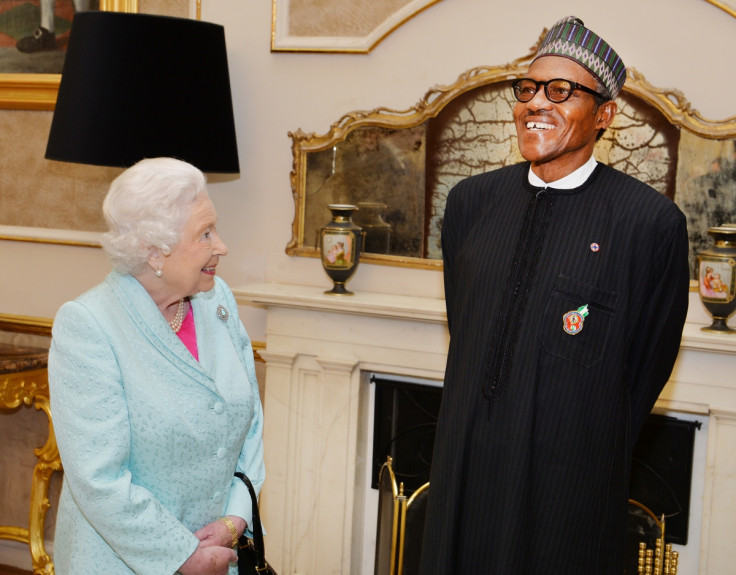UK's hypocrisy on Nigerian corruption

David Cameron recently convened a landmark international anti-corruption summit in London to galvanise a global response to tackle corruption. This herculean task requires the support of business and political leaders of major countries to solve the serious challenges.
The world was shocked when Cameron told the Queen in a remark caught on camera: "We've got some leaders of some fantastically corrupt countries coming to Britain ... Nigeria and Afghanistan, possibly the two most corrupt countries in the world." The choice of words in the presence of royalty is curious for an Oxford first class honours graduate prime minister. Fantastic for whom? Fantastic from what perspective?
There really is something positive in the semantic collocation of 'fantastic'. Was this really just bad taste, ill-advised flippancy, or really a Freudian slip from the deep structure of British elitism? These questions are valid given the view of some anti-corruption researchers that the systematic transfer of funds to the UK from various parts of the developing world has been 'fantastic' for its economy.
The fact that one single former Nigerian military head of state, Ibrahim Abacha, siphoned up to $5bn out of the county and more than half of that amount infamously made its way to the UK and was subsequently laundered in five other Western countries was perhaps 'fantastic' for many banks in the UK.
Of course public officers in Nigeria are appallingly corrupt. This perhaps is why Nigerian President Muhammadu Buhari refused to throw a tantrum over the characterisation of his country and opted to hit Britain back where it could hurt. His response: "I am not demanding an apology from anybody, I am demanding a return of assets."
However, even by the commonly accepted Transparency International Corruption Perception table, Nigeria in 136<sup>th position out of 167 is statistically not one of the 'two most corrupt' countries in the world. Neither is Afghanistan. North Korea and Somalia are at the bottom of that list.
In a recent visit to Nigeria just last month I fell victim to a brazen car jack on the busy streets of Lagos.
Of course Nigeria is notoriously corrupt. In a recent visit to Nigeria just last month I fell victim to a brazen car-jack on the busy streets of Lagos. Rushing to make a report of the robbery to the police at the Barracks police station in Surulere, the duty officers refused to radio the incident to other police posts unless a bribe of approximately 30 pounds exchanged hands. When the car was found damaged and abandoned three weeks later, a further bribe of 50 pounds was demanded for its release at another station in Shomolu, a Lagos suburb. The level of bribery and corruption and its brazen nature is simply breathtaking.

The working class bear the brunt of this corruption and are overwhelmingly the main victims. Although Nigeria has in truth advanced rapidly from the bottom of the list since the 1990s when Transparency International famously placed it second most corrupt, the average man on the street hardly feels the difference as the political, business, and even religious elites continue to fleece the populace. If you had a thousand stinging bees in your bedroom before but they are somehow reduced to roughly a hundred you may be excused if you hardly notice the difference in the pain that continues to result from each sting.
The truth, however, is that there has been a conspiracy of silence over historical and even more recently the escalating scourge of corruption in the West itself. This silence is even more deafening in relation to the apparent correlation between corruption in places like Africa and the safe havens that countries like the UK provide for stolen funds.
The level of bribery and corruption and its brazen nature is simply breathtaking.
The fact that corruption in Nigeria and developing countries regularly makes the news but that of developed countries is rarely discussed is not an accident. The major vehicles of news dissemination on a global scale have their home in the West and a natural censoring of damaging news occurs in the mainstream press. It is not really a case of patriotic news coverage as much as an increasingly cosy relationship between the business class and the media-owning class.
Take for instance the decades-long stranglehold Berlusconi had over the Italian press allowing scandals to be effectively swept under the carpet. Similar reticence held true for Mitterrand and Sarkozy's France and Juan Cotino's troubled Valencian parliament in Spain.
Returning to the inauspicious statements made by David Cameron. The UK's position as 10th least corrupt in the Transparency International's Corruption Perceptions Index, is not exactly a stellar record for a world leader in global business standards. In any case corruption league tables are notoriously subjective and unreliable. They may in fact be deceptive and mask the seriousness of the growing rot.
Unequal treatment of white collar corrupt conduct among the citizenry is approaching developing world standards.
The UK has a deeper corruption problem than the TI list underscores and evidence of high level condonement abound. Recently the UK House of Lords Privileges and Conduct Committee decided to allow peers suspected of fiddling their expenses to avoid formal investigation if they agreed to retire from the House. Such unequal treatment of corrupt white collar conduct among the citizenry is approaching developing world standards.
In the last decade alone there has been dozens of investigations into corrupt enrichment by MPs and even cash for questions practices in the Houses of Parliament. Many more questions have since surfaced after the revelations from the Panama Papers expose.
Apart from blatant corruption, transparency analysts have identified an increase in acts of bread- and-butter corruption. Transparency International, for instance described the following acts as prevalent in the UK. They include:
* public sector bribery,
* collusion,
* conflict of interest,
* cronyism and nepotism,
* fraud, dodgy gifts and questionable hospitality,
* money laundering,
* revolving-door arrangements,
* abuse of authority or trading in influence, and
* vote rigging.
Of course, there are fundamental differences between corruption in the UK and in places like Nigeria. The breadth of the problem in Nigeria crucially encompasses the civil service sector.
In the West the depth of corruption is emblematic of a silent dance between the political and capitalist classes. Both forms are immoral but the effects are different.
Thus, the breakdown of public services is fast and debilitating as reflected in Chinua Achebe's No Longer at Ease. In the West on the other hand the depth of corruption is emblematic of a silent dance between the political and capitalist classes. Both forms are immoral but the effects are different.
For instance, despite the accumulation of corrupt wealth by Italian politicians and the mafia over the last half century, the damage to the Italian economy is far from the scale experienced by Sudan or Angola. Furthermore, much of the proceeds of Western corruption stays at home whereas that of the Nigeria is siphoned abroad. The World bank has estimated that the amounts involved in global money laundering are in the region of US $800bn – US$ 1tn. US Senator Carl Levin admits: "It is estimated that half of that money comes to the United States".

Another reason why the new Nigerian administration could justifiably debunk Cameron's assessment includes the fact that the Nigerian Economic and Financial Crimes Commission (EFCC) has undeniably proven itself more fit for purpose given its wider success in securing convictions and the amounts recovered as proceeds of corruption crimes. As of 2013 the EFCC had won a thousand convictions in its first decade of existence. In 2014 alone the EFCC has garnered 126 convictions. The UK's Serious Fraud Office even after half a decade of the enactment of the much heralded Bribery Act 2010 has revealed a decidedly underwhelming list of high net-worth convictions.
It is either that this systematic funnelling of corrupt wealth pouring into the UK is deliberately designed - or deliberately tolerated and left unplugged.
The Abacha millions have not been fully repatrated close to two decades after it was declared missing. This is unedifying for the UK's image. And the continued siphoning of Nigeria's funds to the UK has hardly abated. The UK Crown Prosecution Service estimated former governor of Delta State, James Onanefe Ibori's looted around $250m from the Nigeria.
Fortunately international cooperation has resulted in him serving a jail term in a UK prison but his assets included £2.2m six-bedroom house with an indoor pool in Hampstead, a flat opposite the Abbey Road recording studios, a property in Dorset, and three others in the UK. He also possessed a fleet of armoured Range Rovers costing £600,000, a £120,000 Bentley, a £300,000 Mercedes Maybach, and a £12m private jet. The view of civil society is that present governments in Africa ought to step up vigorous pursuit of Africa's stolen funds through the emerging, comprehensive, international framework for the tracing, and repatriation of national wealth.
It is assumed that this systematic funnelling of corrupt wealth pouring into the UK is deliberately designed - or deliberately tolerated and left unplugged. Furthermore the international mischief caused by tax havens and offshore banking jurisdictions - many of which are British-controlled - is finally common knowledge.
Britain remains "by far the most important part of the global offshore system of tax havens and secrecy jurisdictions". This has brought untold suffering to many nations and their financial fortunes. It is in this light that David Cameron should eat some of the humble pie he seems to liberally dish out to other world leaders. What would be fantastic is David Cameron hastening the return of Nigeria's stolen wealth. Nigeria and other developing states have been asking for expedited action for decades now. I won't be holding my breath.
Dr. Gbenga Oduntan is Senior Lecturer in International Commercial Law at the University of Kent. He is the author of 'International Law and Boundary Disputes in Africa', and 'Bakassi Resolved: The Final Delimitation and Demarcation of the Boundary Between Cameroon and Nigeria'
© Copyright IBTimes 2025. All rights reserved.






















